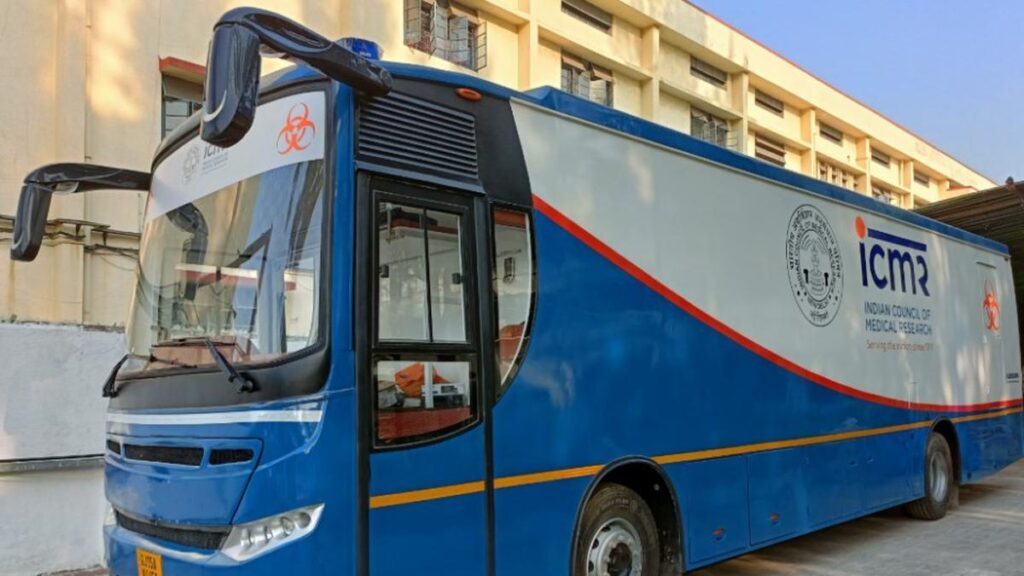
Mobile Biosafety level-3 (MBSL-3). Photo: PIB
The Indian Council of Medical Research (ICMR) is in the process of adding to its Mobile BSL-3 (MBSL-3) laboratory capacity to enhance India’s outbreak response capabilities, and strengthen public health delivery, especially in remote and inaccessible areas. The country currently has two of these innovative and fully indigenous mobile laboratory facilities operational in Pune and Gorakhpur.
“The MBSL-3 was successfully deployed and operationalised for the first time in response to the Nipah virus outbreak in Kozhikode, Kerala, in September 2023, and again in Malappuram district of Kerala in July 2024. The success in Kerala demonstrates the strategic advantage of such rapidly deployable and sophisticated infrastructure in tackling epidemiological challenges posed by high-risk pathogens. This ‘laboratory on wheels’ represents a significant advancement in outbreak investigation and public health emergency response in India,’‘ a senior ICMR official said.
Known as RAMBAAN, this first of its kind Rapid Action Mobile BSL-3 laboratory is an essential part of India’s plan for an ‘Advanced Augmented Network’, and a combination of the MBSL-3 with a well-trained diagnostic team will be an asset for dealing with emerging/re-emerging disease outbreak investigations in the country, the official added.
The ICMR, in its release issued on Wednesday, said that these units were part of an initiative for diagnostic surge capacity in onsite laboratory services during outbreaks of known and unknown high-risk pathogens. The MBSL-3 laboratory is field-deployable, and was developed in partnership with the industrial company Klenzaids Contamination Controls Private Limited, Mumbai, under the Union Health Ministry’s Pradhan Mantri Ayushman Bharat Health Infrastructure Mission.
The MBSL-3 is built on a heavy-duty Bharat Benz vehicle chassis, complaint with BS VI norms, designed to operate at extreme temperatures and altitudes, and bears a maximum load capacity 17 tonnes. It’s classified as a Type-IV Rapid Response Mobile Laboratory in the WHO’s Global Outbreak Alert and Response Network classification.
The laboratory is designed to maintain a negative air pressure environment, and is equipped with an advanced heating, ventilation, and air-conditioning (HVAC) system with HEPA filters. It also features a double door autoclave and a biological liquid effluent decontamination (BLED) and hydrogen peroxide (H2O2) fogger system for biological waste management. The MBSL-3 was validated by ICMR-National Institute of Virology, Pune in 2022-2023, including onsite and on-field validation.
The MBSL-3 laboratory’s work area is divided into four zones — Zone-1 (driver and outer change room); Zone-2 (shower and inner change room); Zone-3 (main laboratory); and Zone-4 (material staging and decontamination area), the ICMR said.
Key installations within these zones include biological safety cabinets, an intelligent programmable logic controller system, a dynamic pass box, and an entry-exit shower system with biometric control. The laboratory’s power supply can be from direct electric supply or a diesel generator, with an uninterrupted power supply and petrol generators for back up.
Communication within the laboratory is facilitated by walkie-talkies, and real-time surveillance through CCTVs. Strict biosafety protocols, BSL-3 practices, and standard operating procedures are followed for specimen handling and processing, including the use of personal protective equipment (coveralls, double gloves, etc.).
The deployment of the MBSL-3 laboratory highlights the importance of a comprehensive checklist for the pre-deployment, deployment, and post-deployment phases, covering several aspects, including personnel health, mobilisation logistics, major installation functioning, approvals, equipment checks, and supply management.
Published – June 25, 2025 08:48 pm IST

